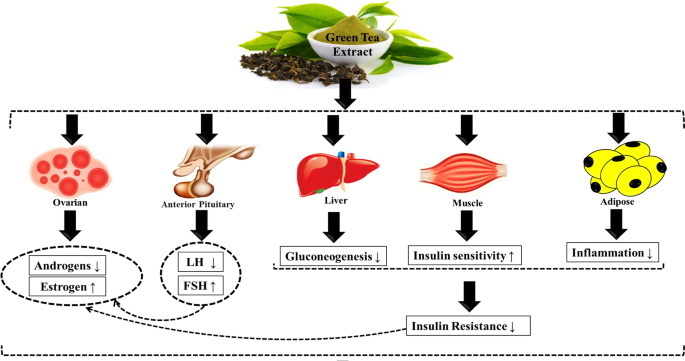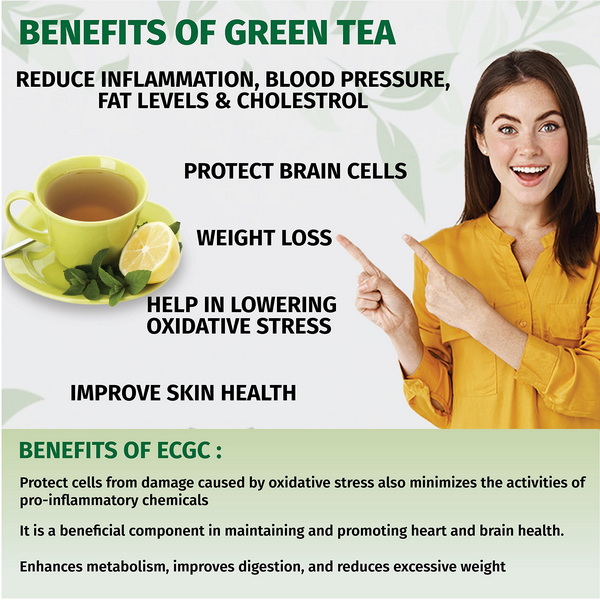Content Menu
● Introduction
● The Power of Antioxidants
● Weight Management and Metabolism Boost
● Heart Health Benefits
● Brain Function and Neuroprotection
● Cancer Prevention
● Skin Health and Anti-Aging Properties
● Liver Protection
● Blood Sugar Regulation
● Immune System Support
● Exercise Performance and Recovery
● Oral Health
● Potential Anti-Inflammatory Effects
● How to Incorporate Green Tea Extract
● Safety Considerations
● Conclusion
● Frequently Asked Questions
>> 1. How much green tea extract should I take daily?
>> 2. Can green tea extract help with acne?
>> 3. Is green tea extract safe during pregnancy?
>> 4. How long does it take to see results from green tea extract?
>> 5. Can green tea extract interact with medications?
● Citations:
Introduction
Green tea extract has gained significant popularity in recent years due to its potential health benefits. Derived from the leaves of the Camellia sinensis plant, this concentrated form of green tea is packed with powerful antioxidants and bioactive compounds. In this comprehensive article, we'll explore the numerous benefits of green tea extract and why it has become a staple in many health-conscious individuals' routines.

The Power of Antioxidants
Green tea extract is rich in polyphenols, particularly catechins, which are potent antioxidants. The most abundant and well-studied catechin in green tea is epigallocatechin gallate (EGCG). These antioxidants help protect our cells from damage caused by free radicals, which are unstable molecules that can lead to various health issues and accelerate aging.
Weight Management and Metabolism Boost
One of the most popular reasons people turn to green tea extract is for its potential to aid in weight loss and boost metabolism. The combination of caffeine and catechins in green tea extract may help increase fat oxidation and energy expenditure, potentially leading to weight loss when combined with a healthy diet and exercise regimen.
Heart Health Benefits
Green tea extract has been associated with improved cardiovascular health. Studies have shown that regular consumption of green tea extract may help:
- Lower total and LDL (bad) cholesterol levels
- Increase HDL (good) cholesterol
- Reduce blood pressure
- Improve blood flow
These effects can contribute to a reduced risk of heart disease and stroke.
Brain Function and Neuroprotection
The combination of caffeine and L-theanine in green tea extract may have positive effects on brain function. These compounds can help improve:
- Focus and concentration
- Memory
- Reaction time
- Overall cognitive performance
Additionally, the antioxidants in green tea extract may have neuroprotective properties, potentially reducing the risk of neurodegenerative diseases like Alzheimer's and Parkinson's.
Cancer Prevention
While more research is needed, some studies suggest that the high concentration of antioxidants in green tea extract may help prevent the development and progression of certain types of cancer. The EGCG in green tea has been shown to inhibit tumor growth and induce cancer cell death in laboratory and animal studies.
Skin Health and Anti-Aging Properties
Green tea extract's antioxidant properties extend to skin health as well. When applied topically or consumed orally, it may help:
- Reduce inflammation
- Protect against UV damage
- Improve skin elasticity
- Reduce the appearance of fine lines and wrinkles
Many skincare products now incorporate green tea extract due to these potential benefits.
Liver Protection
Some studies suggest that green tea extract may have protective effects on the liver. It may help reduce the risk of liver disease and improve liver function in individuals with existing liver issues. However, it's important to note that excessive consumption of green tea extract can also lead to liver damage, so moderation is key.
Blood Sugar Regulation
Green tea extract may help improve insulin sensitivity and reduce blood sugar levels. This can be particularly beneficial for individuals with or at risk of type 2 diabetes. Regular consumption of green tea extract may help manage blood sugar levels and reduce the risk of diabetes-related complications.
Immune System Support
The antioxidants and polyphenols in green tea extract may help boost the immune system. These compounds have been shown to have antimicrobial properties and may help the body fight off infections and diseases.
Exercise Performance and Recovery
Green tea extract may enhance exercise performance and recovery. The caffeine content can improve endurance and reduce fatigue, while the antioxidants may help reduce exercise-induced oxidative stress and muscle damage.
Oral Health
The catechins in green tea extract have been shown to have antibacterial properties that may benefit oral health. Regular consumption may help:
- Reduce bad breath
- Prevent tooth decay
- Improve gum health

Potential Anti-Inflammatory Effects
Chronic inflammation is linked to various health issues, including heart disease, cancer, and autoimmune disorders. The anti-inflammatory properties of green tea extract may help reduce the risk of these conditions and alleviate symptoms in individuals with inflammatory diseases.
How to Incorporate Green Tea Extract
There are several ways to incorporate green tea extract into your routine:
1. Supplements: Green tea extract capsules or tablets are widely available.
2. Beverages: Some drinks are fortified with green tea extract.
3. Skincare products: Look for lotions, serums, or masks containing green tea extract.
4. Cooking: Green tea extract powder can be added to smoothies, baked goods, or other recipes.
Safety Considerations
While green tea extract is generally considered safe for most people when used in moderation, it's important to be aware of potential side effects and interactions:
- Caffeine sensitivity: Green tea extract contains caffeine, which may cause jitters, anxiety, or sleep disturbances in sensitive individuals.
- Liver concerns: High doses of green tea extract have been linked to liver damage in some cases.
- Iron absorption: Green tea may interfere with iron absorption, so it's best to consume it between meals.
- Medication interactions: Green tea extract may interact with certain medications, including blood thinners and some antibiotics.
Always consult with a healthcare professional before adding green tea extract to your routine, especially if you have any pre-existing health conditions or are taking medications.
Conclusion
Green tea extract offers a wide range of potential health benefits, from supporting heart health and brain function to aiding in weight management and skin health. Its high concentration of antioxidants and bioactive compounds make it a powerful supplement for overall wellness. However, it's important to use green tea extract responsibly and in moderation to maximize its benefits while minimizing potential risks.
As with any supplement, it's crucial to purchase green tea extract from reputable sources and follow recommended dosage guidelines. By incorporating green tea extract into a balanced lifestyle that includes a healthy diet and regular exercise, you may be able to harness its many potential health-promoting properties.
Frequently Asked Questions
1. How much green tea extract should I take daily?
The appropriate dosage of green tea extract can vary depending on the specific product and your individual needs. Generally, most studies have used doses ranging from 250-500 mg of green tea extract per day. It's important to follow the manufacturer's recommendations and consult with a healthcare professional to determine the right dosage for you.
2. Can green tea extract help with acne?
Green tea extract may help with acne due to its anti-inflammatory and antioxidant properties. Some studies have shown that both topical application and oral consumption of green tea extract can reduce acne lesions and improve overall skin appearance. However, more research is needed to fully understand its effectiveness for acne treatment.
3. Is green tea extract safe during pregnancy?
While moderate consumption of green tea is generally considered safe during pregnancy, the concentrated nature of green tea extract raises some concerns. The high levels of caffeine and catechins in green tea extract may affect fetal development and increase the risk of complications. It's best to consult with your healthcare provider before using green tea extract during pregnancy or breastfeeding.
4. How long does it take to see results from green tea extract?
The time it takes to see results from green tea extract can vary depending on the specific benefit you're looking for and individual factors. Some effects, like improved mental alertness, may be noticeable within hours of consumption. Other benefits, such as weight loss or improvements in cholesterol levels, may take several weeks or months of consistent use to become apparent. Patience and consistent use are key when incorporating green tea extract into your health routine.
5. Can green tea extract interact with medications?
Yes, green tea extract can interact with certain medications. It may interfere with blood thinners like warfarin, increase the effects of stimulant medications, and potentially reduce the effectiveness of some antibiotics and anti-cancer drugs. Additionally, the caffeine in green tea extract can interact with various medications and supplements. It's crucial to discuss potential interactions with your healthcare provider before starting green tea extract, especially if you're taking any medications.
Citations:
[1] https://www.healthline.com/nutrition/10-benefits-of-green-tea-extract
[2] https://pubmed.ncbi.nlm.nih.gov/38031409/
[3] https://www.mountsinai.org/health-library/herb/green-tea
[4] https://www.alamy.com/stock-photo/green-tea-extract.html
[5] https://www.youtube.com/watch?v=eMuE16vLV_s
[6] https://www.youtube.com/watch?v=t4Gcrc9lMog
[7] https://www.medicalnewstoday.com/articles/269538
[8] https://www.freepik.com/free-photos-vectors/green-tea-extract
[9] https://health.clevelandclinic.org/green-tea-extract-a-better-way-to-boost-energy-or-not
[10] https://www.webmd.com/vitamins/ai/ingredientmono-960/green-tea





























